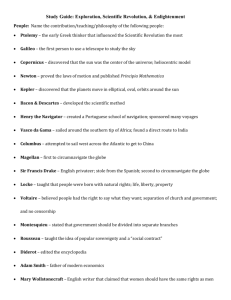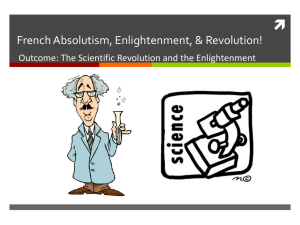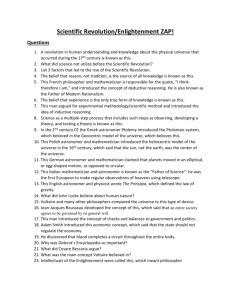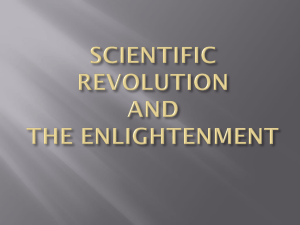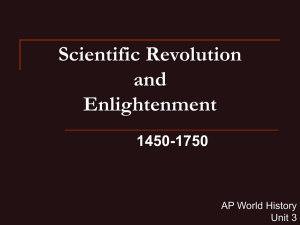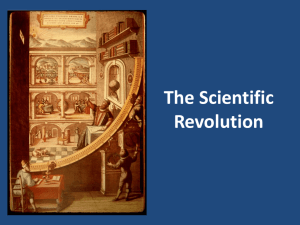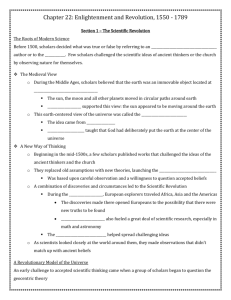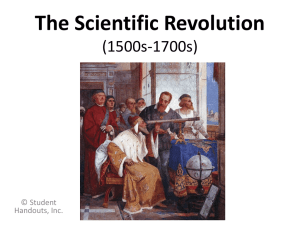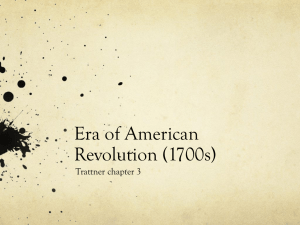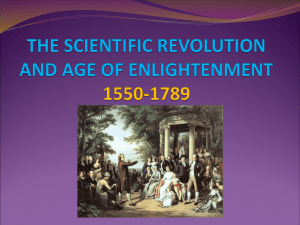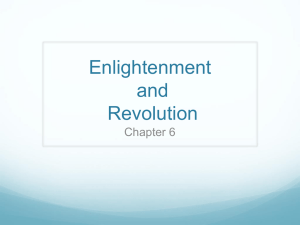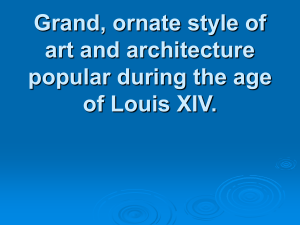SciRevENLIGHT
advertisement
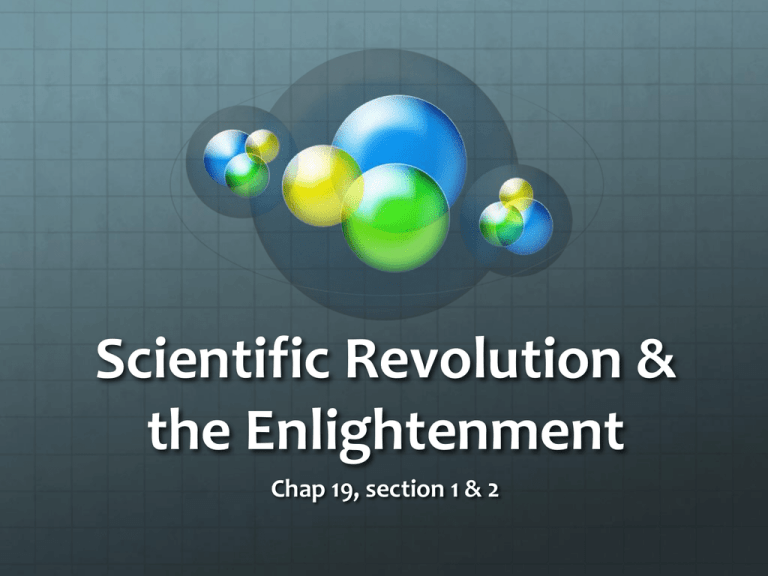
Scientific Revolution & the Enlightenment Chap 19, section 1 & 2 The Scientific Revolution marked the beginning of a dramatic shift in how people viewed the world. The medieval and early modern European outlook had been dominated by religion. As a result of this revolution, many came to see the world predominantly in secular and scientific ways. In the short term, the Scientific Revolution set the stage for the Enlightenment; its long-term repercussions can still be felt today. What was the scientific revolution A revolution in human understanding and knowledge about the physical universe 17th century Began with Kepler, Galileo’s astronomic discoveries Ended with Newton’s major works Science before the Revolution “Science” before the revolution by thinkers who were more philosophers No experimental method or observation Alchemy, astrology Science is a habit of mind, It involves using reason, observation, testing, and systematic thought to uncover truths about the world and about people, animals, and things in the world. Factors leading to change Knowledge from the Arab world Knowledge of new peoples and animals from explorations, contact with non-western cultures Rise of universities and Renaissance ideals Rise of Rationalism and Empiricism Rationalism & Empricism Reason, not tradition, is the source of all knowledge, René Descartes (1596–1650) French philosopher and mathematician Cogito ergo sum (“I think, therefore, I am”) Deductive reasoning Francis Bacon (English), the way to gain knowledge is through observation and experimentation Scientific Method Identify a problem Form a hypothesis Perform experiments to test the hypothesis Record the results Analyze the results to prove the hypothesis true or false Roots of modern science Aristotle, 4th century BC, earth at center of universe Ptolemy, 2nd century astronomer/mathematician, geocentric theory Copernicus (1473–1543) Polish, 1500s, recognizes heliocentric theory, complete model of the solar system On the Revolutions of the Heavenly Spheres, 1543 Tycho Brahe (1546–1601) Danish astronomer court of King Frederick II, who sponsored two observatories Amassed accurate astronomical data Discovers supenovas Argued that the Moon and Sun revolve around the Earth while other planets revolve around the Sun Johannes Kepler (1571– 1630) German astronomer and mathematician, student of Tycho Didn’t agree with Tycho’s interpretation of data Disagreed with Copernicus, claiming that other bodies moved in elliptical motion, as opposed to circular motions Theorized three laws of planetary motion using Tycho’s data Galileo Galilei (1564– 1642) Italian mathematician, astronomer “Father of Science” Telescopes and astronomical discoveries Discovers Saturn, moon craters, Milky Way Conflicts with Church The church condemned heliocentric conceptions of the universe The Roman Inquisition Galileo’s trial 1633 Galileo recants, put under house arrest Sir Isaac Newton (1642– 1727) English astronomer, physicist, and mathematician Synthesized the works of Copernicus, Kepler and Galileo The Principia-new view of the world Gravity & the apple Controversy calculus Biology Ancient knowledge of Galen Andreas Vesalius, Flemish doctor, Univ. of Padua, dissection, 1543 William Harvey, 1600s,English, blood and circulatory system Antony van Leeuwenhock, Dutch 1600s, microscope, micro organisms Robert Hooke, English, create terms cell Chemistry Robert Boyle, father of modern chemistry, matter as cluster of tiny particles, Boyle’s Law: how temperature, volume, and pressure affect gases Antoine-Laurent Lavoisier, French 1700s, name oxygen, metric system of measurement, first periodic table Science, Art & Society Artists use human anatomy knowledge Mathematics affect architecture Beginnings of modern science, new view of univrse as a well-ordered system Lead to philosophers and scholars seeking new understanding of society Reexamine old ideas on government, religion, education, and economics The Enlightenment The era known historically as the Enlightenment marks the intellectual beginning of the modern world. Ideas originating in this era would gradually spread around the world creating challenges to existing traditions and ways of governing. Many governments today have Enlightenment principles as the basis of their constitutions and forms of government. In addition, the expansion of suffrage to women, blacks, and people of all classes is a legacy of the Enlightenment. Age of Reason 1600s reason can be used to solve all problems Ideas spread through inexpensive pamphlets, magazines, books 1700s Paris the center of intellectual activity • Salons: gatherings for aristocrats to discuss new theories and ideas • Philosophes: French Enlightenment thinkers who attended the salons New Views on Government Thomas Hobbes, English, 1651 Leviathan Applied rational analysis to the study of government Attacked the concept of divine right, yet supported a strong monarchy, the monster “leviathan” Believed that humans were basically driven by passions and needed to be kept in check by a powerful ruler People live lives that are “solitary,poor, nasty, brutish, and short” in the state of nature People need governments to impose order Form a social contract-give up some freedoms to government for guarantees of peace, safety, and order John Locke (1632-1704) English People are naturally happy, tolerant, and reasonable All born with the natural rights of life, liberty, and property Purpose of government is to protect these rights If they don’t, can over throw Jean-Jacques Rousseau (1712–1778) The Social Contract, “Man is born free, but everywhere is in chains.” Equality key French Baron de Montesquieu (1689–1755) French nobleman 1748 treatise The Spirit of the Laws. Years before writing the treatise, Montesquieu had visited several European countries, carefully observing the workings of each nation’s government. In The Spirit of the Laws, he laid out a comparative study of types of governments, then put forward his own theory of government. Separation of Powers Executive, Legislative, Judicial Best form of government is constitutional monarchy New Views on Society Religious toleration, women’s rights, and economic systems lead to philosophers 1700s Denis Diderot, French, 28 volumes, criticizes the gov’t, the Church and legal systems Takes 27 years, spreads ideas across Europe and North America Voltaire (1694–1778) Most famous philosophe Wrote plays, essays, poetry, philosophy, and books Attacked the “relics” of the medieval social order Championed social, political, and religious tolerance Above all, Voltaire attacked intolerance in society, politics, and religion. A famous quote usually attributed to Voltaire states, “I disapprove of what you say, but I will defend to the death your right to say it.” Imprisoned twice, exiled to England for a time Candide, a young man goes searching around the world for enlightenment and wisdom Role of Women Mary Wollstonecraft, English, 1792, A Vindication of the Rights of Woman Olympe de Gouges, Economics Adam Smith, Scottish, 1776, The Wealth of Nations Business activities should take place in a free market Laissez-faire economics, an economic system that worked without government regulation Ideas Spread Monarchs interested in ideas develop government according to ideals- enlightened despots Challenge long held ideals Church & govenrment, human reason can solve any problem-how to make society more just Reformers become revolutionaries Prussia Frederick II, 1740-1786 Number of reformseducation, abolish torture, religious toleration (not Jews), reduce censorship Russia Catherine II, 1762 Correspond with Voltaire and Diderot Reforms considered too liberal for elites Austria Joseph II, son of Maria Theresa Reign 1780-1790, ambitious reform Abolish torture, death penalty, free food and medicine for poor, abolish serfdom, laborers paid Religious tolerance for Protestants and Jews (he Catholic) Key Ideas The ability to reason is what makes humans unique Reason can be used to solve problems and improve peoples lives Reason can free people from ignorance, superstition, and unfair government The natural world is governed by laws that can be discovered through reason Like the natural world, human behavior is governed by natural laws Governments should reflect natural laws and encourage education and debate
